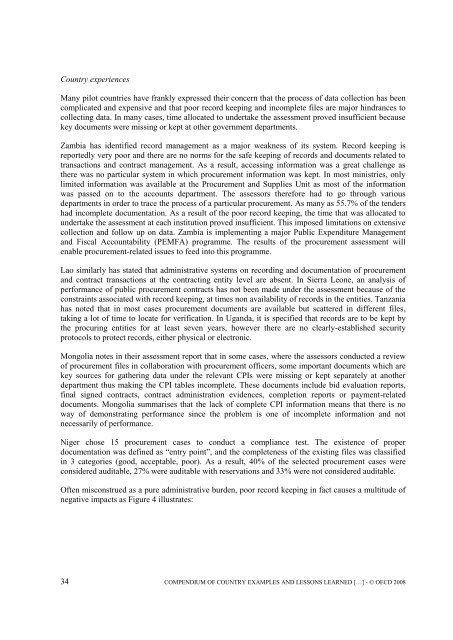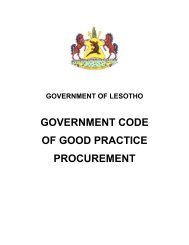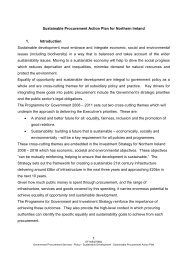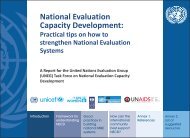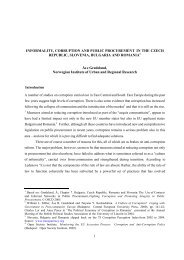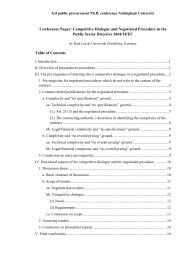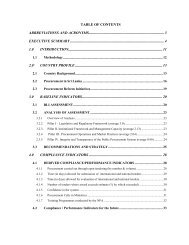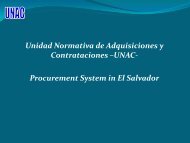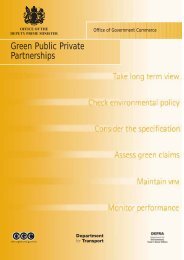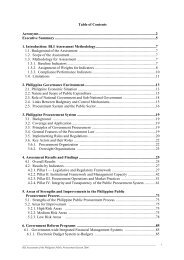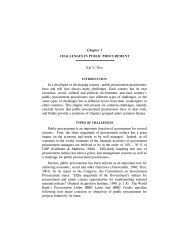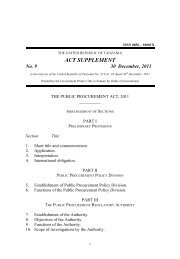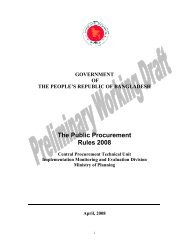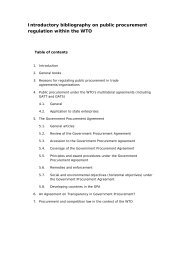Compendium of Country Examples and Lessons Learned from ...
Compendium of Country Examples and Lessons Learned from ...
Compendium of Country Examples and Lessons Learned from ...
Create successful ePaper yourself
Turn your PDF publications into a flip-book with our unique Google optimized e-Paper software.
<strong>Country</strong> experiencesMany pilot countries have frankly expressed their concern that the process <strong>of</strong> data collection has beencomplicated <strong>and</strong> expensive <strong>and</strong> that poor record keeping <strong>and</strong> incomplete files are major hindrances tocollecting data. In many cases, time allocated to undertake the assessment proved insufficient becausekey documents were missing or kept at other government departments.Zambia has identified record management as a major weakness <strong>of</strong> its system. Record keeping isreportedly very poor <strong>and</strong> there are no norms for the safe keeping <strong>of</strong> records <strong>and</strong> documents related totransactions <strong>and</strong> contract management. As a result, accessing information was a great challenge asthere was no particular system in which procurement information was kept. In most ministries, onlylimited information was available at the Procurement <strong>and</strong> Supplies Unit as most <strong>of</strong> the informationwas passed on to the accounts department. The assessors therefore had to go through variousdepartments in order to trace the process <strong>of</strong> a particular procurement. As many as 55.7% <strong>of</strong> the tendershad incomplete documentation. As a result <strong>of</strong> the poor record keeping, the time that was allocated toundertake the assessment at each institution proved insufficient. This imposed limitations on extensivecollection <strong>and</strong> follow up on data. Zambia is implementing a major Public Expenditure Management<strong>and</strong> Fiscal Accountability (PEMFA) programme. The results <strong>of</strong> the procurement assessment willenable procurement-related issues to feed into this programme.Lao similarly has stated that administrative systems on recording <strong>and</strong> documentation <strong>of</strong> procurement<strong>and</strong> contract transactions at the contracting entity level are absent. In Sierra Leone, an analysis <strong>of</strong>performance <strong>of</strong> public procurement contracts has not been made under the assessment because <strong>of</strong> theconstraints associated with record keeping, at times non availability <strong>of</strong> records in the entities. Tanzaniahas noted that in most cases procurement documents are available but scattered in different files,taking a lot <strong>of</strong> time to locate for verification. In Ug<strong>and</strong>a, it is specified that records are to be kept bythe procuring entities for at least seven years, however there are no clearly-established securityprotocols to protect records, either physical or electronic.Mongolia notes in their assessment report that in some cases, where the assessors conducted a review<strong>of</strong> procurement files in collaboration with procurement <strong>of</strong>ficers, some important documents which arekey sources for gathering data under the relevant CPIs were missing or kept separately at anotherdepartment thus making the CPI tables incomplete. These documents include bid evaluation reports,final signed contracts, contract administration evidences, completion reports or payment-relateddocuments. Mongolia summarises that the lack <strong>of</strong> complete CPI information means that there is noway <strong>of</strong> demonstrating performance since the problem is one <strong>of</strong> incomplete information <strong>and</strong> notnecessarily <strong>of</strong> performance.Niger chose 15 procurement cases to conduct a compliance test. The existence <strong>of</strong> properdocumentation was defined as “entry point”, <strong>and</strong> the completeness <strong>of</strong> the existing files was classifiedin 3 categories (good, acceptable, poor). As a result, 40% <strong>of</strong> the selected procurement cases wereconsidered auditable, 27% were auditable with reservations <strong>and</strong> 33% were not considered auditable.Often misconstrued as a pure administrative burden, poor record keeping in fact causes a multitude <strong>of</strong>negative impacts as Figure 4 illustrates:34 COMPENDIUM OF COUNTRY EXAMPLES AND LESSONS LEARNED […] - OECD 2008


